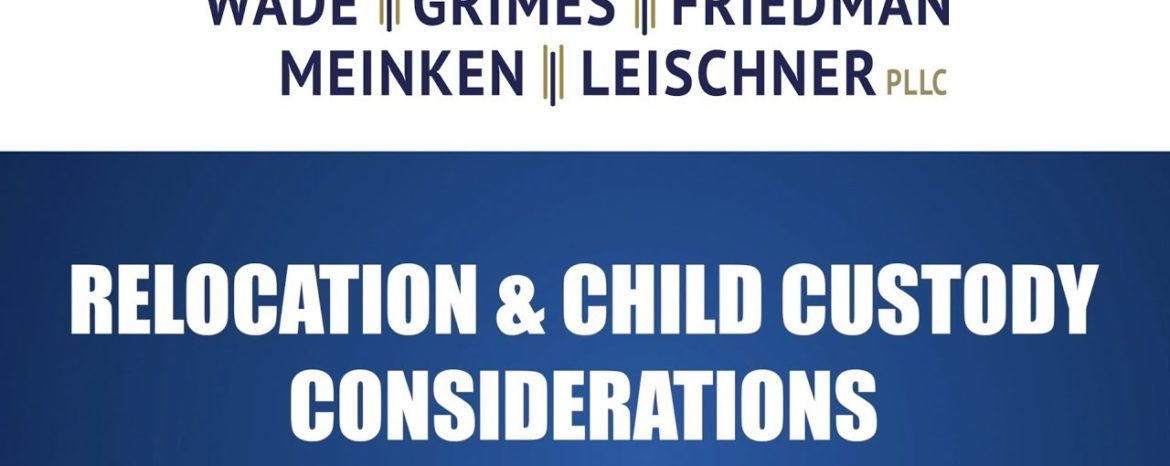Relocation & Child Custody Considerations
There are many factors to consider when deciding whether or not child custody relocation is right for you and your child. Family law attorney Jessica Leischner explains these child custody considerations on this week’s FAQ Friday.
If you’re a parent considering relocation, there are a number of factors that must be weighed to prove your case. “It’s not simply ticking boxes one two and three,” family law attorney Jessica Leischner explains. “It’s really fact specific.”
“First, you need to consider whether the move is voluntary or a requirement,” says Leischner. Secondly, you must consider the relationship between the child and the non-custodial parent. “How often does the child see the other parent and how involved is that parent? Does the parent attend school functions or go to doctors appointments? Those things can make a big difference.”
Lastly, parents considering relocation should weigh the independent benefits for the child upon relocation. “Depending on the situation,” says Leischner, “moving to be closer to family or to live in a better school district could benefit the child positively and could ultimately be grounds for relocation.”
“As soon as the possibility of relocation arises, it’s important to meet with an experienced attorney who can help you weigh the circumstances as a whole,” explains Leischner. “Planning far in advance for relocation can help avoid any road bumps and get you closer to ensuring the best possible outcome for the child.”
Is It Hard to Get a Custody Relocation Case Approved?
“I’m noticing that it is getting harder and harder to get relocation cases approved,” says family law attorney Jessica Leischner. “There has been a shift in recent years towards more cases of shared custody.”
Is It Getting Harder to Get a Custody Relocation Case Approved?
“It used to be that one parent was a primary custodian, and the other parent got every other weekend,” Leischner explains. If the primary custodial parent wanted to relocate, it was easy to argue that the beneficial relationship between the non-custodial parent and the child would not be able to be maintained — either by allowing more time in the summer, over holidays or during school breaks.
“However, today you have many more shared custody cases, where both parents already have substantial time with the child,” explains Leischner. Therefore, it is difficult to argue that a beneficial relationship of the non-custodial parent would not be maintained.”
When to Contact an Attorney About Relocation
However, there is hope. Leischner says as soon as you know there’s potential for a relocation, whether you are seeking the relocation or opposing it, you should consult an experienced attorney. “That way, you can start preparing your case and hopefully recognize that it’s not a situation where you’re going to lose your child. The situation can be worked out and handled in a way that benefits the child.”
How to Stop a Custody Relocation
When confronted with the possibility of your child being relocated, your first reaction might be to panic. However, as family law attorney Jessica Leischner explains, there are ways to stop a custody relocation from taking place.
Can My Ex Leave the State with My Child?
Unless both parents are in agreement, the parent who wishes to move with the child must be granted permission from the court before so doing.
What Can I Do to Stop a Custody Relocation?
“So if you’re a parent who wants to stop a relocation, the first thing you need to do is file a motion in court to enjoin the relocation,” says Leischner. “Make it very clear in writing to the other parent and in court that you object and do not agree to the child relocating.”
In addition to clearly stating your opposition to the relocation, it’s important to consider your level of parental involvement. “If you haven’t been involved in the child’s schooling, actively co-parenting and going to extracurricular activities, those factors may count against you if you are trying to stop a relocation,” explains Leischner.
You need to seriously ask yourself if you are in a position to take custody of your own child. Some questions to consider are:
- Do you have room for the child in your life?
- Is your lifestyle amenable to caring for the child full time?
- Can you provide the best care possible for your child?
If your answer is “yes” to all of these questions, then you must be able to prove to the judge that you are a viable custody alternative.
“These cases can be highly contentious and the more combative the parents are at the start, the worse the relocation process is going to be,” says Leischner. “The better relationship the parents have, the better it’s going to go.”
When to Contact an Attorney to Stop a Child Relocation
Leischner says as soon as you know there’s potential for a custody relocation, you should immediately consult an attorney to weigh the circumstances as a whole. “That way, you can start preparing your case and hopefully recognize that it’s not a situation where you’re going to lose your child. The situation can be worked out and handled in a way that benefits the child.”
About the Author

Jessica L. Leischner
Jessica L. Leischner is partner with Friedman, Grimes, Meinken & Leischner PLLC. As an accomplished family law attorney, litigator and mediator serving Northern Virginia, Ms. Leischner represents clients in Fairfax County, Alexandria City, Arlington County, Loudoun County, Stafford County, and Prince William County. Ms. Leischner’s practice is exclusively in the area of family law, including divorce, child custody, visitation, child support, spousal support, equitable distribution, settlement agreements, property rights, post-divorce disputes and other family law matters.
Related Content:

